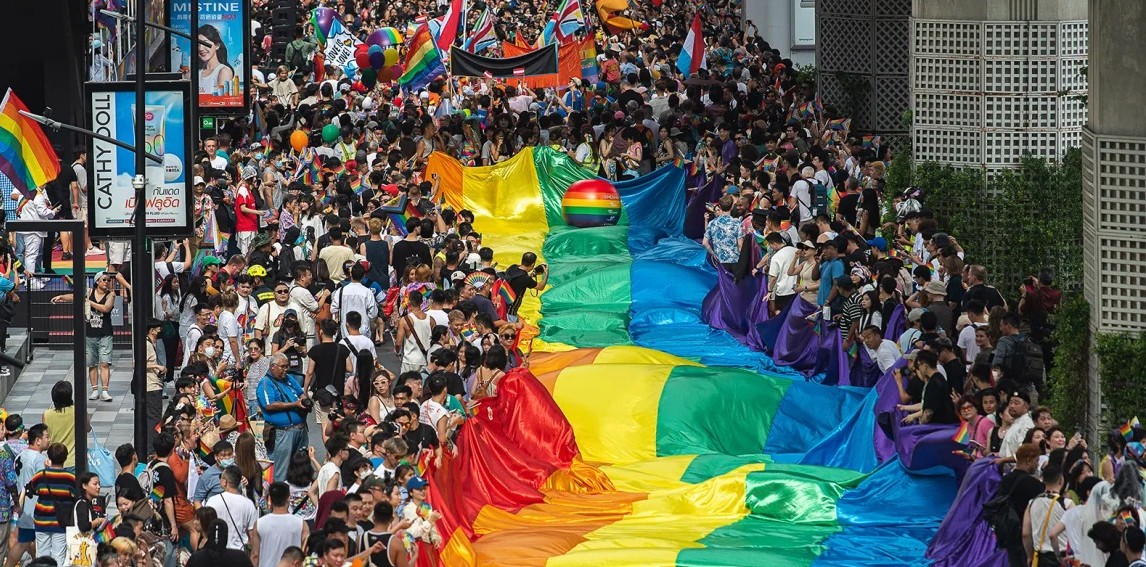The historic 130-4 parliamentary vote on June 18 sealed an incredible movement and victory for supporters of marriage equality in Thailand.
Thailand is poised to become the first country in Southeast Asia to legalize same-sex marriage following the Senate’s approval of a marriage equality bill on Tuesday. This decision has been hailed as a “monumental step forward for LGBTQ+ rights” by supporters.
In an overwhelmingly decisive vote, the Senate passed the bill with 130 senators in favour and only four opposing it. The bill now awaits the king’s endorsement, which is seen as a mere formality. Once endorsed, the law will come into effect 120 days after its publication in the royal gazette.
This development positions Thailand as not just the first ASEAN country to have legalised same-sex marraige, but only the third Asian country to embrace marriage equality, following Taiwan in 2019 and Nepal in 2023.

Panyaphon Phiphatkhunarnon, founder of the Love Foundation, an NGO advocating for LGBTQ+ rights in Thailand, expressed optimism: “The bill represents a monumental step forward for LGBTQ+ rights in Thailand. The potential impact of this bill is immense. It would not only change the lives of countless couples but also contribute to a more just and equitable society for all.”
The bill extends the same legal rights and recognition to LGBTQ+ couples as it does to heterosexual couples. This includes rights related to inheritance, adoption, and healthcare decision-making. Panyaphon added, “Beyond the legal implications, the passage of this bill would send a powerful message of acceptance and inclusion.”
Bangkok residents Pokpong Jitjaiyai and Watit Benjamonkolchai plan to marry as soon as the law is passed. Pokpong reflected on his past: “When I was young, people said people like us couldn’t have a family, can’t have children, so marriage was impossible. Over 10 years ago, we could not live together the way we are now. We could never be our true selves, the way it is now… and now I can freely say that I am gay.” He hopes the bill will start a domino effect in other countries, stating, “I want the people around the world to see how love is. Love is love.”

The bill has received support from all major political parties, marking a significant step in solidifying Thailand’s reputation as one of the most progressive, LGBTQ+-friendly countries in the region. Previous attempts to legalize same-sex marriage had stalled, including a 2020 ruling by the Constitutional Court that upheld the constitutionality of the current law defining marriage as between a man and a woman.
As an outlier in a region where LGBTQ+ rights are often restricted, Thailand’s move is significant. In several Southeast Asian countries, same-sex relations are criminalised, and the LGBTQ+ community faces widespread discrimination. For example, here in Malaysia, homosexuality remains illegal, and though seldom prosecuted, is nevertheless punishable by fines and up to 20 years in prison. Meanwhile, Indonesia’s widely criticised new Criminal Code, ratified in 2022, criminalises consensual sex outside of marriage, impacting LGBTQ+ individuals disproportionately.
Singapore recently repealed a colonial-era law criminalising sex between men but maintains its opposition to marriage equality. Japan, the only G7 country that does not recognise same-sex unions, has faced court rulings challenging this stance.
In mainland China, there has been a crackdown on LGBTQ+ activism, while South Korea, which does not legally recognise same-sex marriage, has made incremental gains through court rulings in favour of same-sex couples seeking equal health benefits.
In the run-up to Thailand’s historic decision, Prime Minister Srettha Thavisin, of the Pheu Thai Party, had promised to bring the marriage equality bill to parliament.

Dressed in a rainbow shirt, Srettha attended Pride Month celebrations in Bangkok earlier in June, joining a massive parade through the capital’s streets.
“It is a basic right to choose who to love,” he said in a post on X on June 1.
Srettha has been keen to showcase Thailand as a welcoming destination for LGBTQ+ people, including voicing support for a bid to host World Pride in 2030.
“We have come far in our journey towards social equality. I want to reaffirm my government’s commitment in pushing for the realization of the Equal Marriage Bill which today we can visibly see the light at the end of the tunnel,” Srettha said on X on June 1.
“We look forward to hosting of the World Pride in 2030 in Thailand.”
"ExpatGo welcomes and encourages comments, input, and divergent opinions. However, we kindly request that you use suitable language in your comments, and refrain from any sort of personal attack, hate speech, or disparaging rhetoric. Comments not in line with this are subject to removal from the site. "



















